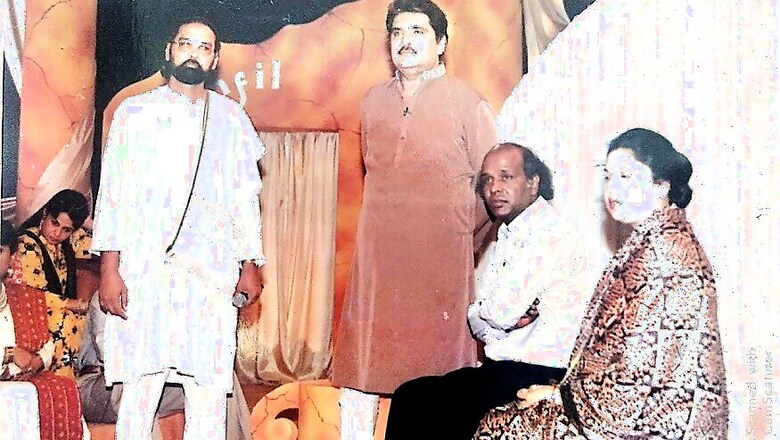
views
“Sabhi ka khoon shaamil hai is mitti me, kisi ke baap ka Hindustan thodi hai,” resonated at the anti-CAA protests not long ago and will foreseeably lend strength to struggle against discriminatory laws in future. But, the creator of the electrifying lines, famous poet Rahat Indori, left a void in the world of poetry as he succumbed to cardiac arrest on Tuesday.
The rousing poet and lyricist breathed his last at Indore’s Aurobindo Hospital, where he was admitted on Monday after he tested positive for coronavirus. He was 70 and is survived by his people and poetry without melody.
The sudden demise of the famous poet has left his fellow poets and the youth in shock.
“What he wrote years ago has become more relevant now, who would have thought it would work like a prophecy. But that’s what poets do! Ab aajkal ki halat ko dekhte huey (looking at present times), the same old poetry has acquired a new relevance,” said his old friend and poet Nawaz Deobandi, who has been inviting Indori at local mushairas to the town in Western Uttar Pradesh, for years.
He fondly remembered him for his ability to be romantic as well as a rebellious poet. "He was versatile," said Deobandi.
Indori’s poetry was as regular at the anti CAA-NRC-NPR protests as the protestors themselves. “Unpar ek ilzaam tha ke woh ek communal shayar hain. Magar woh ek sachche aur kadwe shayar they (Rahat Indori was often accused of being a communal poet but in reality he was an honest and a bitter poet),” added Deobandi.
His poetry was rooted in reality and is also an inspiration for the young protest poets like Iqra Khilji, a law student, who said, “He was the door between the two worlds, resonated with the young and old alike. For some, he represented the nostalgia of yesteryear glories of Urdu poetry. For others, ‘Kisi ke baap ka Hindustan thodi hai,’ became the ultimate declaration of a new-born revolution. His words are a reminder to not create poetry in a void severed from reality.”
On sullen days, "Hausle zindagī ke dekhte haiñ chaliye kuchh roz jī ke dekhte haiñ...'' gives her heart the “much-needed assurance that everything will be alright”. Khilji finds Indori’s poetry honest, relevant and fearless in challenging power, “reminding ‘Saahib-e-Masnad' of their place. “If his witty couplets could create ripples of appreciative laughter, the very next ones could fill your heart and eyes with their raw sincerity,” she said.
Indori became a poet at a time when his style of poetry was unknown, the stage was familiar with melody or ‘tarrannum’ of 60s. “But then Indori conquered the ‘mehfils’ and ‘musharias’ with his unique style, he was a ‘tarrannum shikan shayar’ (a poet divorced from melody),” said his friend Waseem Barelvi, who used to co-travel with the deceased poet to ‘mushairas’.
“After him, others also started copying the ‘tarannum shikan shayari’, it became a rage with young poets. He was a rebel to break from the tradition of melody when it was at peak. With this style he became the soul of the words he recited… maane, woh lafz ki rooh banjaate they,” said Barelvi.
“He was a man who was one of the last few keepers of traditional Urdu poetry, and who ever so gracefully passed it onto the flag bearers of tomorrow,” Khilji said.















Comments
0 comment